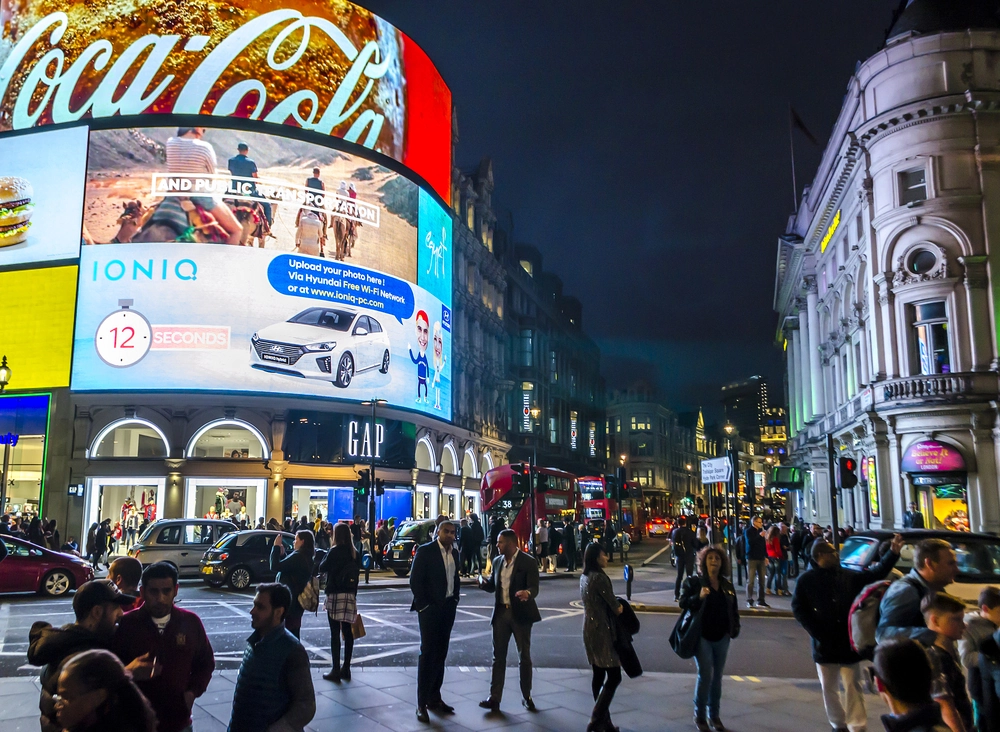

Five big themes and stories in the retail and consumer sector from October 2022.
In this article we look at:
- Why embodied carbon is important for retailers.
- Rising costs and economic uncertainty causing disputes.
- The risks of technology innovation.
- Retailers getting involved in public policy.
- Acting quickly if brand collaborations go sour.
Marks & Spencer’s proposal to demolish and redevelop its Marble Arch store on Oxford Street is subject to a planning enquiry which could have far reaching consequences. The enquiry is considering the potential environmental damage of M&S’ proposal and the role of embodied carbon in construction and the case for a retrofit-first approach.
Opponents of M&S’ redevelopment argue the M&S scheme would release almost 40,000 tonnes of carbon into the atmosphere. The Architect’s Journal reports that the emissions impact of this is equivalent to driving a typical car 99 million miles, further than the distance to the Sun. M&S has pledged that 95% of the materials in its existing building will be recovered, recycled or reused and argues the new building will be far more sustainable in the long term.
The M&S dispute shows the emerging and hitherto neglected issue of embodied carbon. Embodied carbon is the carbon generated to produce, maintain and demolish a built asset. This includes emissions caused by extraction, manufacture/processing, transportation and assembly of every product and element in an asset. It may also include the maintenance, replacement, deconstruction, disposal and end-of-life aspects of the materials and systems that make up the asset. It excludes operational emissions of the asset.
Embodied carbon is a significant environmental issue but currently largely neglected by UK environmental policy and plans to reach net zero. The World Green Building Council estimates that 11% of global energy-related carbon emissions are attributable to embodied carbon in buildings. Advocates for change want to reduce construction waste by reusing and repurposing existing structures where possible rather than demolishing and building new.
Our Projects, Infrastructure & Construction team has prepared an article on embodied carbon and the legislative landscape including contractual strategies to address the issue.
Retailers are embedding environmental targets at all levels. Tesco is the first UK supermarket to link executive pay to sustainability targets. 25% of the Performance Share Plan awards Executive Directors receive will depend on Tesco’s progress on key sustainability measures including gender and ethnicity representation, carbon reduction and food waste reduction in its own operations.
We have seen more cost pressures across the retail supply chain causing disputes between suppliers and retailers. For example, the Groceries Code adjudicator is set to question supermarkets over alleged delays to payments and delays in processing requests from suppliers for CPI price increases.
The present economic environment is creating conditions for disputes. Common themes we are seeing are:
- Current contracts are no longer profitable for suppliers, and customers are being presented with ultimatums demanding price increases.
- Businesses are servicing increasingly cost-conscious consumers and they do not want to pass on price increases to maintain customer loyalty.
- One or more of the parties to a contract are attempting to end contracts early.
- Price discussions for new contracts are more time-consuming given the uncertain economic environment.
- Parties being more proactive in enforcing restrictive covenants or protecting IP / databases.
- Changing economic conditions causing issues for contracts with deferred consideration or performance-based consideration.
We have collated some top tips for businesses who face pricing issues to help avoid protracted disputes about pricing.
An Irish civil liberties lobby group has suggested checkout free grocery stores that require customers to be members of a loyalty scheme or have an account with a retailer may infringe the principle of data minimisation in the UK GDPR. This principle is that personal data must be limited to what is necessary in relation to the purposes for which they are processed.
The complaint isn’t substantiated in any detail and seems to refer to stores where checkout-free is the only payment option, a model from which Tesco seems to be moving away in its most recent GetGo stores. The lobby group’s argument is that it is unacceptable for checkout-free stores to make access to essential goods such as groceries conditional on providing personal data which is then processed and shared via loyalty card apps for purposes wider than simply enabling the customer to buy goods. Whether this claim has any basis remains to be seen but is an example of the importance of considering the legal impact of technology transformation, particularly technologies that involve capturing customer data (whether through an app or using facial recognition for example).
Kanye West’s spectacular fall from grace following offensive public comments has shown the importance of retailers having contractual protections so they can take swift action if a commercial collaboration such as a sponsorship agreement, joint venture, agency agreement or agreement with a social media influencer goes sour, causing reputational and consequential commercial damage. One of West’s biggest collaborators has said it stands to lose £217m following the termination of its partnership. Retailers should ensure their collaboration contracts set out clearly when a contract can be terminated by the retailer and ensure as far as possible a retailer can recover costs and losses stemming from their collaborator’s breach.
October was a month of political turmoil which saw retailers entering the policy debate. Iceland boss Richard Walker spoke at the Conservative Party conference calling for a Universal Credit uplift and is now bidding to be a Conservative MP. Tesco chair John Allan spoke publicly about the cost-of-living crisis and the policy directions of the main political parties and said Tesco had “a moral responsibility to look after people who, in the real world, are being impacted”. Ikea is partnering with charity Shelter and calling on the government to build 90,000 social homes a year by 2030.
Retailers have been eager to support consumers in the cost-of-living crisis, recognising this is necessary from both a moral and commercial standpoint. We could see more vocal interventions by retailers in the policy sphere over coming months, particularly as the new Prime Minister’s economic plans take shape. This is first because retailers have very up to date and useful information on how the cost-of-living crisis is impacting consumers. Second, retailers are under pressure from stakeholders and investors to be proactive on ESG and arguably cannot wait for government policy to take shape before acting. However, retailers need to make sure public statements about ESG and the cost-of-living crisis are substantiated by meaningful actions across the business to avoid accusations similar to greenwashing, where environmental claims are found to be misleading.
Marks & Spencer’s proposal to demolish and redevelop its Marble Arch store on Oxford Street is subject to a planning enquiry which could have far reaching consequences. The enquiry is considering the potential environmental damage of M&S’ proposal and the role of embodied carbon in construction and the case for a retrofit-first approach.
Opponents of M&S’ redevelopment argue the M&S scheme would release almost 40,000 tonnes of carbon into the atmosphere. The Architect’s Journal reports that the emissions impact of this is equivalent to driving a typical car 99 million miles, further than the distance to the Sun. M&S has pledged that 95% of the materials in its existing building will be recovered, recycled or reused and argues the new building will be far more sustainable in the long term.
The M&S dispute shows the emerging and hitherto neglected issue of embodied carbon. Embodied carbon is the carbon generated to produce, maintain and demolish a built asset. This includes emissions caused by extraction, manufacture/processing, transportation and assembly of every product and element in an asset. It may also include the maintenance, replacement, deconstruction, disposal and end-of-life aspects of the materials and systems that make up the asset. It excludes operational emissions of the asset.
Embodied carbon is a significant environmental issue but currently largely neglected by UK environmental policy and plans to reach net zero. The World Green Building Council estimates that 11% of global energy-related carbon emissions are attributable to embodied carbon in buildings. Advocates for change want to reduce construction waste by reusing and repurposing existing structures where possible rather than demolishing and building new.
Our Projects, Infrastructure & Construction team has prepared an article on embodied carbon and the legislative landscape including contractual strategies to address the issue.
Retailers are embedding environmental targets at all levels. Tesco is the first UK supermarket to link executive pay to sustainability targets. 25% of the Performance Share Plan awards Executive Directors receive will depend on Tesco’s progress on key sustainability measures including gender and ethnicity representation, carbon reduction and food waste reduction in its own operations.
We have seen more cost pressures across the retail supply chain causing disputes between suppliers and retailers. For example, the Groceries Code adjudicator is set to question supermarkets over alleged delays to payments and delays in processing requests from suppliers for CPI price increases.
The present economic environment is creating conditions for disputes. Common themes we are seeing are:
- Current contracts are no longer profitable for suppliers, and customers are being presented with ultimatums demanding price increases.
- Businesses are servicing increasingly cost-conscious consumers and they do not want to pass on price increases to maintain customer loyalty.
- One or more of the parties to a contract are attempting to end contracts early.
- Price discussions for new contracts are more time-consuming given the uncertain economic environment.
- Parties being more proactive in enforcing restrictive covenants or protecting IP / databases.
- Changing economic conditions causing issues for contracts with deferred consideration or performance-based consideration.
We have collated some top tips for businesses who face pricing issues to help avoid protracted disputes about pricing.
An Irish civil liberties lobby group has suggested checkout free grocery stores that require customers to be members of a loyalty scheme or have an account with a retailer may infringe the principle of data minimisation in the UK GDPR. This principle is that personal data must be limited to what is necessary in relation to the purposes for which they are processed.
The complaint isn’t substantiated in any detail and seems to refer to stores where checkout-free is the only payment option, a model from which Tesco seems to be moving away in its most recent GetGo stores. The lobby group’s argument is that it is unacceptable for checkout-free stores to make access to essential goods such as groceries conditional on providing personal data which is then processed and shared via loyalty card apps for purposes wider than simply enabling the customer to buy goods. Whether this claim has any basis remains to be seen but is an example of the importance of considering the legal impact of technology transformation, particularly technologies that involve capturing customer data (whether through an app or using facial recognition for example).
Kanye West’s spectacular fall from grace following offensive public comments has shown the importance of retailers having contractual protections so they can take swift action if a commercial collaboration such as a sponsorship agreement, joint venture, agency agreement or agreement with a social media influencer goes sour, causing reputational and consequential commercial damage. One of West’s biggest collaborators has said it stands to lose £217m following the termination of its partnership. Retailers should ensure their collaboration contracts set out clearly when a contract can be terminated by the retailer and ensure as far as possible a retailer can recover costs and losses stemming from their collaborator’s breach.
October was a month of political turmoil which saw retailers entering the policy debate. Iceland boss Richard Walker spoke at the Conservative Party conference calling for a Universal Credit uplift and is now bidding to be a Conservative MP. Tesco chair John Allan spoke publicly about the cost-of-living crisis and the policy directions of the main political parties and said Tesco had “a moral responsibility to look after people who, in the real world, are being impacted”. Ikea is partnering with charity Shelter and calling on the government to build 90,000 social homes a year by 2030.
Retailers have been eager to support consumers in the cost-of-living crisis, recognising this is necessary from both a moral and commercial standpoint. We could see more vocal interventions by retailers in the policy sphere over coming months, particularly as the new Prime Minister’s economic plans take shape. This is first because retailers have very up to date and useful information on how the cost-of-living crisis is impacting consumers. Second, retailers are under pressure from stakeholders and investors to be proactive on ESG and arguably cannot wait for government policy to take shape before acting. However, retailers need to make sure public statements about ESG and the cost-of-living crisis are substantiated by meaningful actions across the business to avoid accusations similar to greenwashing, where environmental claims are found to be misleading.




































































